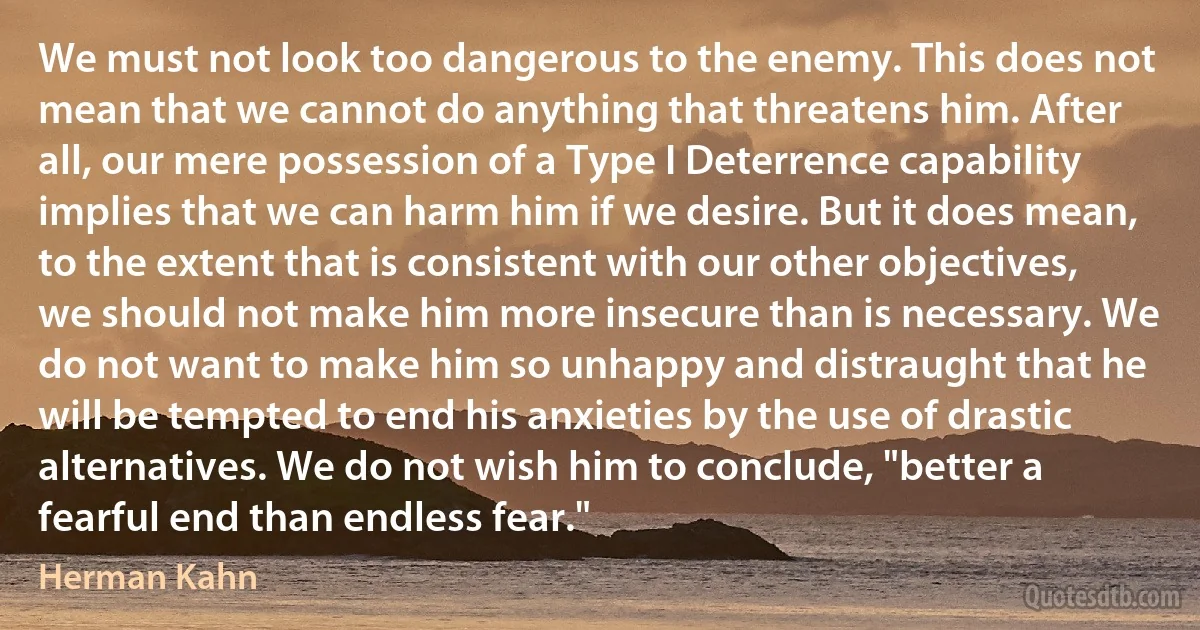
We must not look too dangerous to the enemy. This does not mean that we cannot do anything that threatens him. After all, our mere possession of a Type I Deterrence capability implies that we can harm him if we desire. But it does mean, to the extent that is consistent with our other objectives, we should not make him more insecure than is necessary. We do not want to make him so unhappy and distraught that he will be tempted to end his anxieties by the use of drastic alternatives. We do not wish him to conclude, "better a fearful end than endless fear."
Herman KahnRelated topics
anything desire deterrence drastic end enemy fear harm mean mere necessary possession should unhappy use wishRelated quotes
I am grateful for what I am & have. My thanksgiving is perpetual. It is surprising how contented one can be with nothing definite - only a sense of existence. Well, anything for variety. I am ready to try this for the next 1000 years, & exhaust it. How sweet to think of! My extremities well charred, and my intellectual part too, so that there is no danger of worm or rot for a long while. My breath is sweet to me. O how I laugh when I think of my vague indefinite riches. No run on my bank can drain it - for my wealth is not possession but enjoyment.

Henry David Thoreau
If every day a man takes orders in silence from an incompetent superior, if every day he solemnly performs ritual acts which he privately finds ridiculous, if he unhesitatingly gives answers to questionnaires which are contrary to his real opinions and is prepared to deny his own self in public, if he sees no difficulty in feigning sympathy or even affection where, in fact, he feels only indifference or aversion, it still does not mean that he has entirely lost the use of one of the basic human senses, namely, the sense of humiliation.

Václav Havel
Of this voyage, I observe,' says the Admiral, 'that it has miraculously been shown, as may be understood by this writing, by the many signal miracles that He has shown on the voyage, and for me, who for so great a time was in the court of Your Highnesses with the opposition and against the opinion of so many high personages of your household, who were all against me, alleging this undertaking to be folly, which I hope in Our Lord will be to the greater glory of Christianity, which to some slight extent already has happened.

Christopher Columbus
Do not do anything without signing yourself with the sign of the Cross! When you depart on a journey, when you begin your work, when you go to study, when you are alone, and when you are with other people, seal yourself with the Holy Cross on your forehead, your body, your chest, your heart, your lips, your eyes, your ears. All of you should be sealed with the sign of Christ's victory over hell. Then you will no longer be afraid of charms, evil spirits, or sorcery, because these are dissolved by the power of the Cross like wax before fire and like dust before the wind.

Cleopa Ilie
God always was, and always is, and always will be. Or rather, God always Is. For Was and Will be are fragments of our time, and of changeable nature, but He is Eternal Being. And this is the Name that He gives to Himself when giving the Oracle to Moses in the Mount. For in Himself He sums up and contains all Being, having neither beginning in the past nor end in the future; like some great Sea of Being, limitless and unbounded, transcending all conception of time and nature, only adumbrated [intimated] by the mind, and that very dimly and scantily.

Gregory of Nazianzus
